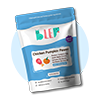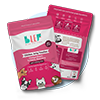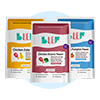Just like humans, dogs too go through a lot of health trouble during the winter. Many of the human issues also affect our pups, with common dog diseases in the winter being respiratory issues, joint issues, dry skin, pneumonia, infectious diseases, etc.
Especially affected during this time of the year are short-coat dogs, such as Beagles, Dachshunds, Labradors, or even indies. Long-coat and double-coat dogs like Shih Tzus, Golden Retrievers, German Shepherds, or Huskies have better natural protection against the cold. Double-coat dogs have a soft, inner layer of fur and a coarse, protective layer of fur over it, giving extra insulation. However, there may be a number of factors that cause winter illnesses in dogs other than the cold itself.

What are some of the common dog diseases in the winter?
Kennel Cough
Kennel cough, or canine infectious tracheobronchitis, is a viral disease that can be caught year-round but is especially active in dogs during winters. Some common signs of the disease include dry, ragged coughs, fever, runny nose, sneezing, discharge from the eye, and loss of appetite.
Kennel cough is one of the more common dog diseases in the winter because the dry, cold air can irritate the nasal channel and make it easier for infections to take hold. Immunity also faces a dip in the winters. Many pet parents also travel during the winters in India, keeping their dogs in pet boarding. Because dogs spend a lot of time indoors in the cold weather and remain in close contact with each other, especially in multi-dog homes or boarding houses, the highly-contagious virus spreads even faster.
Remedies: There is a vaccine available for kennel cough that can provide some protection from the worst effects of the disease. Apart from that, since it’s a viral disease, rest and fluids are the main ways of tackling it. Cough suppressants and antibiotics may help with symptoms. Make sure you consult your vet before giving any medication.
Flu and Pneumonia
Flu and pneumonia are relatively more common in puppies and senior dogs, although they can affect adults too. Therefore, it is important to take extra protection during the vulnerable life stages. Flu, of course, has the common symptoms of infectious respiratory diseases, such as sneezing, coughing (dry or with phlegm), runny nose, watery eyes, drop in appetite, fever, etc.
The flu may reach a serious stage and turn into pneumonia, with issues travelling from the upper respiratory tract to the lungs themselves. This can be quite dangerous, especially in dogs with shorter snouts like Shih Tzus and Pugs, who naturally have respiratory vulnerabilities. Symptoms of pneumonia in dogs include rapid or irregular breathing, wheezing, lethargy, greenish or bloody nasal discharge, fever, etc.
Remedies: Flu is usually treated symptomatically, like other viral infections. Cough suppressants, antiviral medication, and extra fluids may help. Make sure you consult your vet before giving any medication. In cases of severe pneumonia, hospitalisation and oxygen therapy may be needed.
Arthritis and joint issues
The winters aggravate bone and joint issues in humans, and the same happens with dogs too. Senior dogs are more likely to get stiff, painful joints that cause difficulty in walking and movement. Dogs that have a pre-existing condition of arthritis are especially more vulnerable. Other symptoms include lethargy, oversleeping, inability to jump or play, flinching when touched, peeing and pooping inside the house, etc. During this time, injured dogs also have a very hard time, especially those who have hurt their bones or joints.
Remedies: Arthritis is a chronic condition, so what you can do is address some of the discomforts. If the joint issues are significant, consult your vet for pain medication or physiotherapy. Otherwise, joint supplements, light exercise, and a diet with bone broth may help. Keeping them warm with blankets, wearables, or heaters may also help.

Dry and itchy skin
Another common dog disease in the winter is itchy and dry skin. The moisture in the air naturally helps in keeping a dog’s skin hydrated. The winter air is drier and lacks moisture; therefore, this directly affects the skin of dogs, making it more flaky and prone to irritation. Plus, dogs also keep scratching and licking their itchy skin, sometimes causing injuries. These then may get infected and further cause pain.
The dry and warm indoor air from heaters and blowers may also cause skin dryness in dogs. This is because, just like the cold air from outside, the warm air inside also lacks the necessary moisture to keep the skin barrier protected.
Remedies: For dry and itchy skin, feeding a good amount of healthy fats like fatty fish, fish oil, and eggs may help. For indoors, add a humidifier to help with skin moisture and even breathing.
Smog and pollution discomfort
In India, smog and pollution also intensify in the winter, especially in cities. The air is usually thick with smoke and particulate matter that can affect every part of the body. With dogs also being closer to the ground, dust and larger pollutants that settle near the ground get kicked up by their paws and enter their system in larger doses.
Pollution, in itself, can cause respiratory distress, skin issues, fertility problems, and weakened immunity, and even contribute to lung cancer. Pollution distress in dogs can look a lot like infection or other illnesses, like wheezing, difficulty in breathing, skin issues, watery eyes, fatigue, etc.
Remedies: The way to tackle pollution-related illnesses in dogs is to minimise the contact with pollutants. Take them on shorter, more frequent walks and always away from heavy traffic. Apart from that, try to keep them indoors as much as possible and get an air purifier if possible.
You can read more about this on our blog where we talk about how pollution affects dogs.

What can we do for the prevention of the common dog diseases in the winter?
As the saying goes, prevention is better than cure. So, before the cold settles in for the season, it is best to take some preventative measures against common dog diseases in the winter.
The most important preventive measure you can take against winter dog diseases is to adjust their diet. What they eat plays a huge part in their health, even in the winter. Also, dogs eat a little extra during this time to store calories in their body for the winter, so this is a good opportunity to help them through dietary changes.
-
Immunity takes a major dip in the winter, especially with high pollution. So, feeding food that can boost their immunity, such as chicken, broccoli, eggs, liver, carrots, blueberries, etc., can be really beneficial.
-
For itchy skin and shedding, food rich in omega fatty acids, fatty fish, eggs, and other sources of healthy fats can be great. Collagen-rich broths also help in keeping the skin protected.
-
Water can really help in flushing out impurities, keep skin healthy and hydrated, and relieve some symptoms of mild infections. But dogs usually drink less water in the winter. So, keep a check on their water intake, and add bone broths or wet or mashed food mixed with water if needed.
-
For joints and bones, there is nothing better than a good amount of high-quality protein and collagen from bone broths. Other joint supplements suggested by your vet may also keep some stiffness away.
Looking to explore more tips on how to look after your furry friend? Check out our other guides like Can Dogs Eat Apples?, Can Dogs Eat Blueberries?, Dog Food for Weight Loss, Raw v/s cooked meat for dogs, Home Remedies to cure tick fever, Finding Good Dog Food in India, How many times should I feed my dog?, Things you should do to keep your pet healthy, Types of Dog Food, How Prebiotics and Probiotics can improve your dog's digestion, Essential Tips for a New Dog Parent, What Are Kibbles for Dogs and How Are They Harmful? and others. Each guide is designed to help you make better food and care choices for your dog, to keep them happy, healthy, and thriving.
Resources:
https://www.pawlicy.com/blog/winter-illnesses-in-pets/#flu
https://www.dogseechew.in/blog/most-common-health-problems-in-dogs-during-winters
https://autumntrailsvet.com/understanding-the-risk-of-common-pet-illnesses-in-winter/











